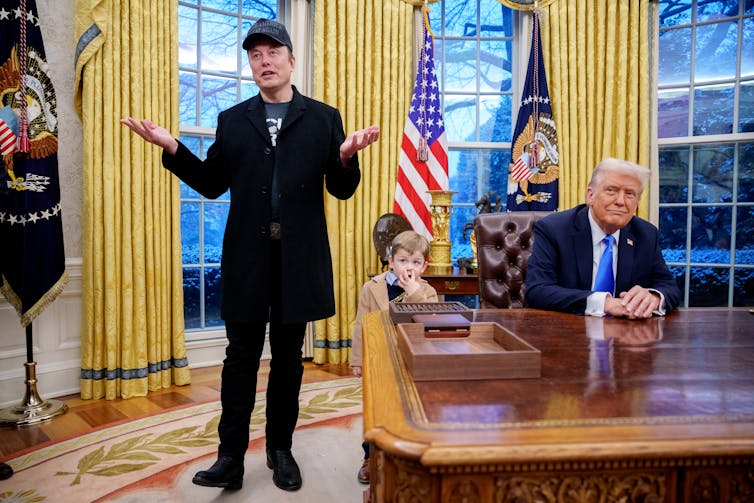I’m a legislation professor who has written about Congress’ energy of the purse and a few of the authorized and constitutional points that encompass it. Right here’s a quick rationalization of the idea – and of why it is best to care about it.
The way it works
Underneath the U.S. Structure, Congress holds what’s generally known as the “power of the purse.” Congress, in different phrases, holds the authority to manage authorities expenditures.
Concretely, Congress could enact legal guidelines that elevate income by means of taxes and import duties, and it might additionally spend cash for “the common Defence and general Welfare,” phrases within the Structure which can be understood to cowl nearly any spending that Congress thinks is a good suggestion.
The Structure, nonetheless, supplies that “[n]o Money shall be drawn from the Treasury, but in Consequence of Appropriations made by Law.” Due to this clause, officers could not spend any authorities cash except a statute “appropriates,” or makes accessible, particular funds for the related function.
Though the Structure forbids any appropriation for the Military that lasts longer than two years, Congress can select in different contexts whether or not to offer an appropriation completely or just for a prescribed size of time. Some advantages packages similar to Social Safety in the present day have everlasting appropriations, however most authorities businesses obtain funds for his or her operations for only a 12 months at a time.
James Madison, who wrote a lot of the U.S. Structure, mentioned Congress’ energy of the purse was ‘the most complete and effectual weapon with which any constitution can arm the immediate representatives of the people.’
wynnter-iStock/Getty Photographs Plus
Leverage over coverage and presidents
Why does all of this matter?
Traditionally, the British Parliament’s management over authorities funds created a robust test on the crown, and Parliament developed the follow of annual appropriations to make sure that it will at all times have leverage over royal coverage.
Reflecting this historical past, James Madison, the fourth president and a number one determine within the Constitutional Conference, wrote within the Federalist Papers that the facility of the purse was “the most complete and effectual weapon with which any constitution can arm the immediate representatives of the people, for obtaining a redress of every grievance, and for carrying into effect every just and salutary measure.”
This form of leverage over coverage nonetheless issues. American presidents in the present day train huge powers. Over time, Congress has conferred intensive regulatory authorities on administrative businesses that function underneath the president’s supervision.
Congress has additionally established a big Military, Navy, and Air Drive over which the president is commander in chief. Presidents, furthermore, have claimed the facility to make use of these armed forces in important methods even with no declaration of struggle or different particular authorization from Congress.
Congress’ energy of the purse offers it a say in how these powers are exercised. If Congress doesn’t like what an administrative company is doing, it could possibly lower its funds or deny funds for implementing sure rules – one thing it does repeatedly.
Likewise, Congress can deny funds for sure navy operations or impose constraints on navy actions – one thing it additionally does with some regularity. Within the Seventies, Congress helped finish the Vietnam Warfare partly by withholding appropriations for navy actions in Indochina.
Who’s in cost right here?
Annual appropriations additionally give rise to the irritating phenomenon of presidency “shutdowns”: If annual funding runs out earlier than Congress enacts new appropriations, authorities businesses usually should halt operations.
On the entire, nonetheless, annual appropriations proceed to serve a lot the identical function in america that they did in Britain: They supply a potent test on the chief department.
Given how robust this test is, it is probably not stunning that presidents have sought methods to get round it.

President Donald Trump, proper, and Elon Musk, left, are chopping congressionally accredited authorities packages and employees – an effort which may be unconstitutional.
Andrew Harnik/Getty Photographs
Primarily based on debatable authorized claims, President Barack Obama continued sure medical health insurance subsidies underneath the Inexpensive Care Act even after Congress denied appropriations for them. President Joe Biden tried large scholar debt aid with out clear authority from Congress. Courts blocked each these actions, however now the brand new Trump administration has adopted a number of controversial insurance policies that implicate Congress’ energy of the purse.
On the one hand, the administration has apparently supplied many federal workers 9 months of paid depart if they comply with resign from federal service. However the authorized foundation for these gives is unclear, and it might be that no present appropriation by Congress supplies funds for them.
Alternatively, the administration has tried to “pause” sure authorities spending, regardless that present appropriations made by Congress could require at the very least a few of this spending.
These actions might violate not solely Congress’ constitutional energy of the purse but additionally particular statutes that Congress has enacted to bolster its constitutional energy.
The buyout gives might violate a legislation known as the Anti-Deficiency Act that makes it illegal, and typically felony, for presidency officers to decide to spending cash with out an appropriation offering the required funds.
For his or her half, the pauses might violate a 1974 legislation known as the Impoundment Management Act that usually forbids the federal government from delaying or withholding spending that Congress has mandated. Courts are actually contemplating challenges to those actions primarily based on these legal guidelines and different points.
Trump could also be hoping that Congress will treatment any authorized issues by ratifying these actions after the very fact in its subsequent spherical of appropriations laws. But when Trump is certainly defying Congress’ spending legal guidelines and but faces no penalties, his actions might chip away at Congress’ authority to test presidential insurance policies sooner or later by means of its spending selections.
James Madison wouldn’t have been happy.



